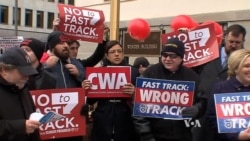With boosting trade a top priority for the Obama administration, 2015 may be the year that an agreement is finally reached on the Trans Pacific Partnership. But the trade deal, which is intended to boost trade between 12 Pacific countries, faces opposition.
Proposed trade deals have sparked demonstrations by labor and environmental groups, who complain few details are public, and what little is known shows the benefits of proposed trade accords helping companies, not people.
“The U.S. stands to lose jobs, see our consumer safety weakened, we stand to see the economy hurt, and public health as well. And that’s not just here, it’s globally, " said Arthur Stamoulis, who heads the Citizens Trade Campaign.
President Barack Obama says trade deals can boost the economy and add jobs. He says the tough negotiations on the Trans Pacific Partnership may soon pay off.
“We are optimistic about being able to get a deal done and we are re-invigorating the negotiations with the Europeans on the Transatlantic trade deal,” he said.
Trade deals are opposed by many Democrats, but Republicans generally support free trade and will have majorities in both houses of Congress in January.
Chief Editor Matthew Schewel of Inside U.S. Trade says the political climate favors trade deals - for a while.
“A lot of the countries and the United States are looking at the next year as a critical window because the following year, 2016, is when the U.S. presidential election campaigns kicks in,” he said.
TPP negotiators are still haggling over tough issues, like market access for farm products and autos.
But trade expert Jeff Schott says the TPP talks are nearly finished because trade ministers recently stepped in to solve disputes that stumped working-level diplomats.
"It [TPP] is the number one priority for trade negotiators and one can very easily be completed in the first half of 2015," he said.
A separate issue called Trade Promotion Authority is under discussion with the U.S. Congress. Under so-called "Fast Track" procedures, Congress votes either “yes” or “no” on a trade deal, but can't make any changes that would require re-negotiating the treaty.
Supporters say TPA makes it easier for the U.S. to make deals with other nations - and it may move forward soon because of Republican control of Congress.
Another proposed trade deal is between the United States and the European Union, but talks on the Transatlantic Trade and Investment Partnership, or T-TIP, are at an early stage.
Opponents of T-TIP and TPP say these agreements would weaken regulations intended to protect health, safety, and labor rights. Supporters of the proposed deals say harmonizing rules makes it easier to sell products around the world.








